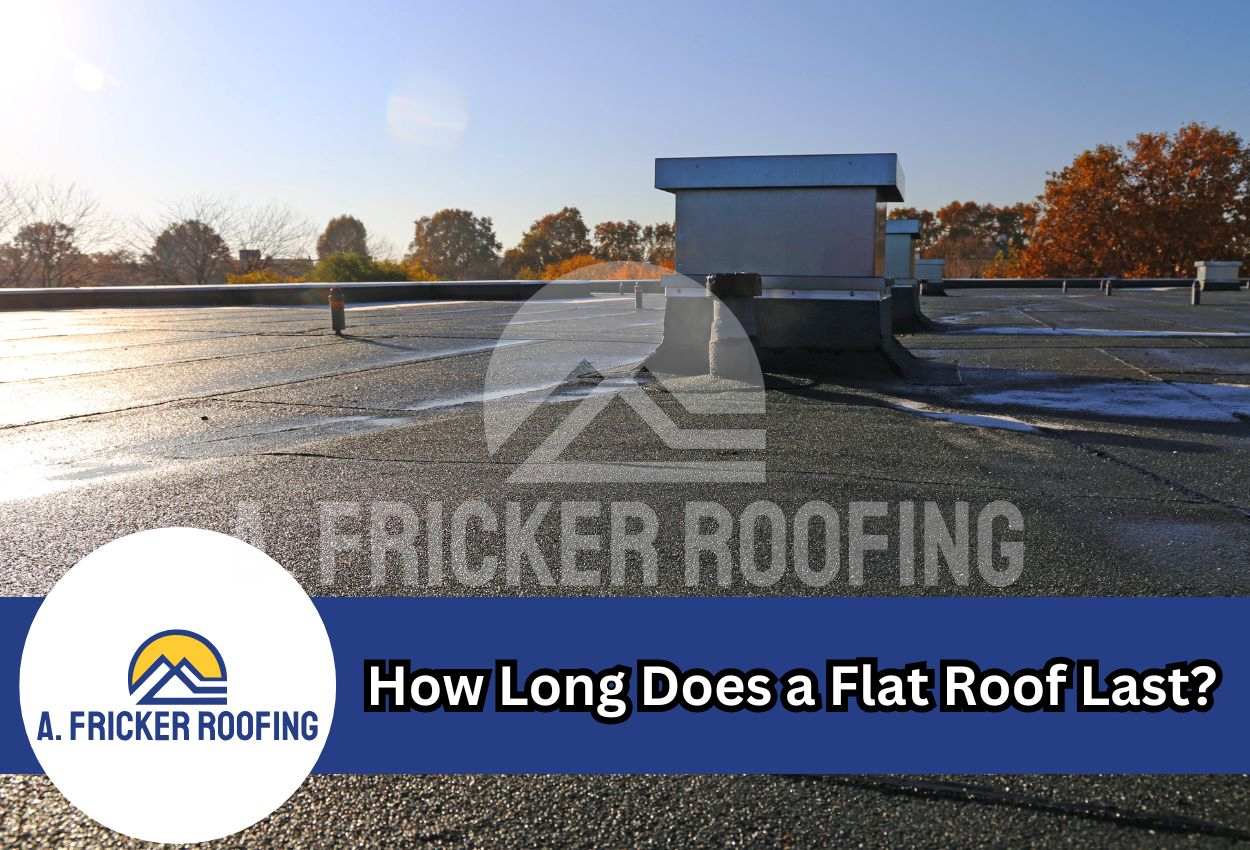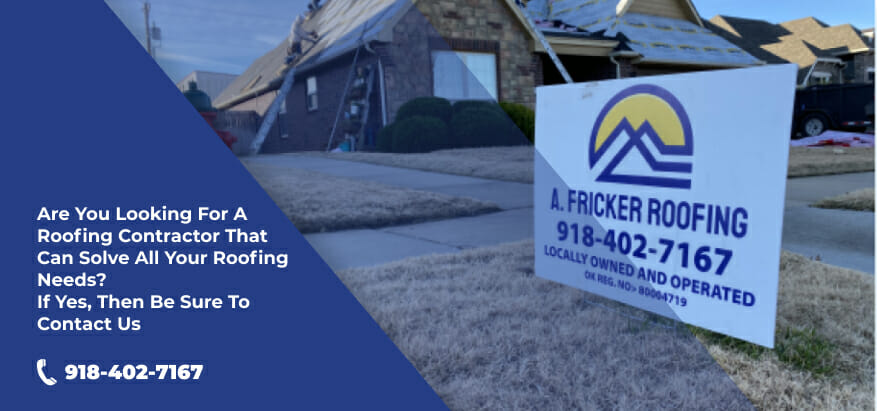While many may not think about it, a flat roof has a much different lifespan than a regular, residential roof with peaks. Whether you’re planning to install a flat roof, or want to know how much longer your current one will hold up, knowing the factors that impact the lifespan of a flat roof can save you time, money, and prevent stress.
In this blog post, we’ll explore how long different types of flat roofs last, what affects their durability, and how to make the most of your investment.
Flat Roofing Material Lifespan
Like peaked roofs, flat roofs have many different materials that can be installed on their surface. Below is how long different flat roofing materials last and what impacts their lifespan.
EPDM (Rubber) Roofs (25 to 30 Years)
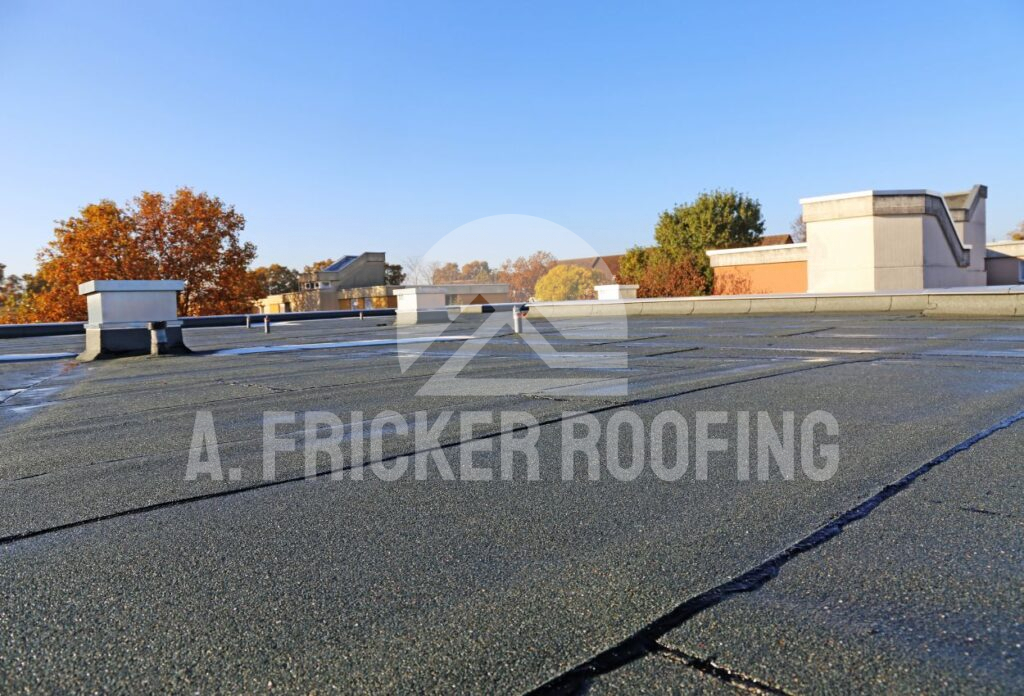
EPDM, or rubber roofing, is one of the best single-ply membranes for flat roofs thanks to its durability and affordability. On average, you can expect an EPDM roof to last between 25 and 30 years, but the results depend on the quality of installation and level of maintenance you put in. These roofs are resistant to UV rays and weathering, making them a solid choice for the Oklahoma climate.
However, their longevity depends on being installed properly. If not, weak seams or the wrong amount of adhesive can lead to leaks over time. Regular inspections and addressing minor wear and tear can keep an EPDM roof in good shape for its entire lifespan, or even longer.
Also Read: All About Ballasted EPDM Roofs
TPO Roofs (15 to 20 Years)
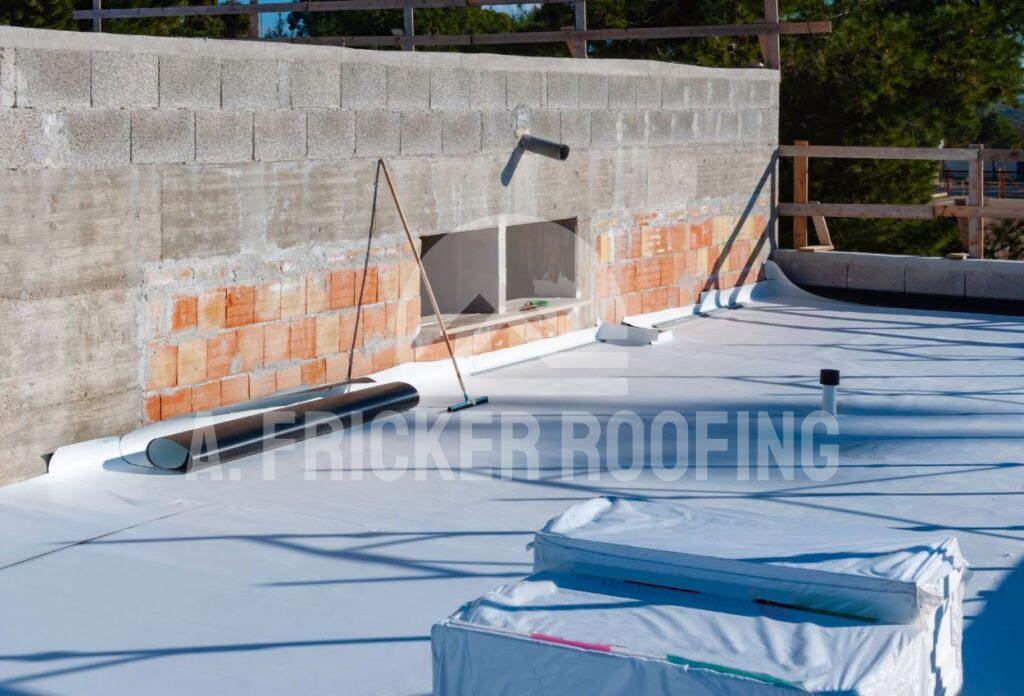
TPO, or thermoplastic polyolefin, is another common flat roofing material that offers excellent energy efficiency and durability. These roofs are known for their reflective properties, which help keep buildings cooler in the summer. A TPO roof typically lasts about 15 to 20 years, though this can vary based on the quality of the material and installation.
While TPO roofing systems have improved in recent years, there are still certain problems with a TPO roof. Some versions were prone to cracking and premature wear, so to ensure longevity, ensure that you install a good quality membrane.
PVC Roofs (20 to 30 Years)
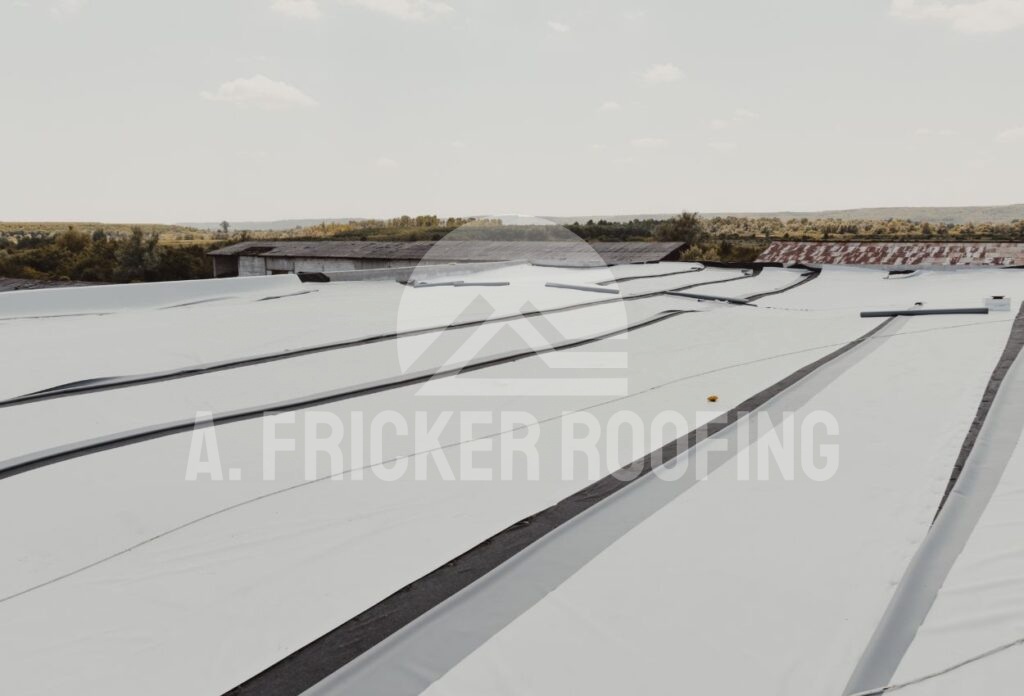
PVC roofs are similar to TPO in some ways, but they tend to be more durable and last longer. On average, a PVC roof can last 20 to 30 years, making it a top-tier option for flat roofs. These roofs are highly resistant to chemicals, fire, and extreme weather, making them a great choice for commercial buildings or homes in harsh environments.
The amount of time a PVC roof will last depends on how it’s installed and maintained. While it costs more upfront than TPO or EPDM, its durability often makes it worth the investment. Again, regular cleaning and inspections help it reach, or even surpass, its expected lifespan.
Modified Bitumen Roofs (15 to 25 Years)
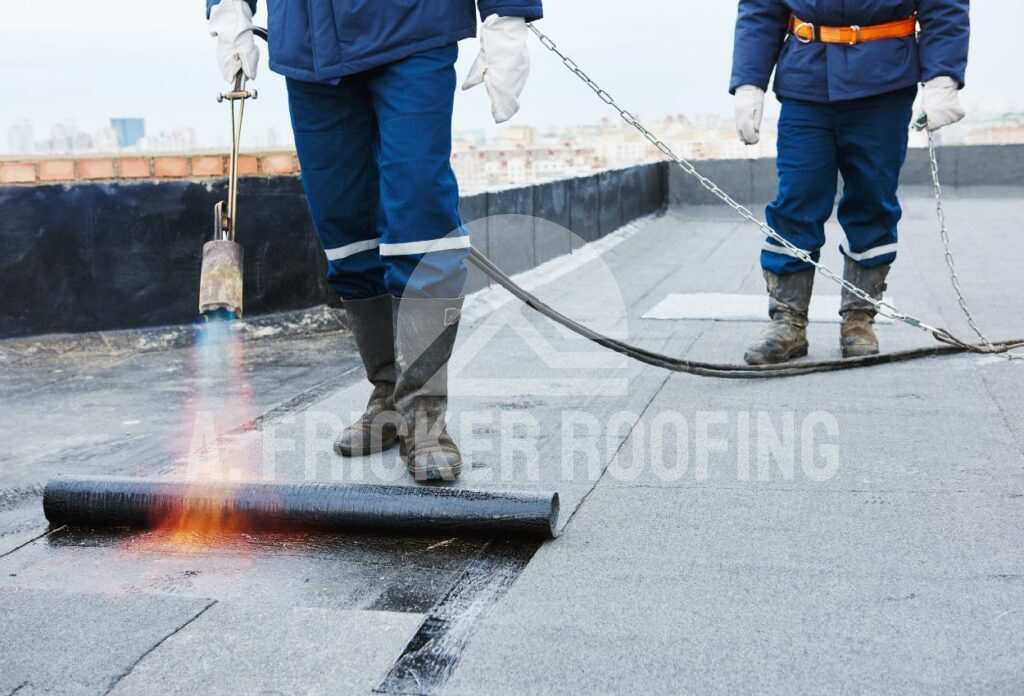
Modified bitumen is a time-tested choice for flat roofs. Also known as mod-bit roofs these can last anywhere between 15 to 25 years. They are made up of asphalt layers reinforced with materials like polyester or fiberglass, which gives them flexibility and strength.
While modified bitumen is tough, it’s not as resistant to UV rays and temperature extremes as some other options. Without proper care, it can develop cracks or leaks over time, so as a building owner, it is important to check your roof, especially after storms and heavy rains.
Built-Up Roofs (BUR) (15 to 20 Years)
Built-up roofs, or BUR, is a roofing system that has been around for years and is still in use today. With layers of asphalt and gravel, it’s known for being tough and weather-resistant. A well-maintained BUR system typically lasts 15 to 20 years, though its lifespan can be affected by pooling water or extreme weather conditions.
BUR roofs require more frequent maintenance than some other flat roofing systems, but their durability makes them a reliable choice for many home and business owners.
Here is a table of different materials along with their average lifespan.
| Material Type | Roofing Type | Lifespan (Years) | Lifespan Rating (Out of 5) | Suitable For | Feature(s) |
| EPDM | Single-ply | 25 to 30 | 4 | Schools/Shopping malls | Highly durable and resistant to UV rays |
| TPO | Single-ply | 15 to 20 | 3.5 | Schools/Restaurants/Office Complex | Highly energy efficient with a reflective surface |
| PVC | Single-ply | 20 to 30 | 4.5 | Warehouses/Factories | Chemical resistant and fire resistant |
| Modified Bitumen | Multi-ply(2-3 layers) | 15 to 25 | 3.5 | Bars/Areas with high foot traffic | Flexible and suitable for temperature extremes |
| Built-Up Roofing (BUR) | Multi-ply(3-4 layers) | 15 to 20 | 3.5 | Large industrial complexes | Classic durability, and resistance to weathering |
Other Factors Affecting How Long A Flat Roof Lasts
As you’ve seen above, the material you install has an important role in how long your roof lasts. However, while the material of your flat roof is a significant factor in its lifespan, other variables can make a big difference. These include:
Climate & Weather:
As a business owner in Oklahoma, you know that the weather can get pretty harsh. Tornadoes, heavy rain, cold and chilly winters, or strong UV exposure all are common in the state, and all these situations can put your roof under stress and shorten its lifespan.
Maintenance:
As a building owner, we know there’s a lot on your plate, but you shouldn’t neglect commercial roof maintenance. This includes regular inspections, cleaning, and minor repairs. Neglecting it is one of the quickest ways to reduce your roof’s lifespan.
Drainage:
Slow drainage is a common problem for flat roofs. Standing water can lead to leaks, sagging, and premature wear, so installing and maintaining an effective drainage system is crucial.
Foot Traffic:
Flat roofs deal with foot traffic more often than pitched roofs, which can lead to the roofing membrane wearing down. If your roof sees a lot of foot traffic, it’s important to reinforce it or take precautions to prevent damage.
Installation Quality:
Even the best materials won’t last if the roof is poorly installed. Always work with experienced professionals to ensure your roof is built to last. At A.Fricker Roofing and Waterproofing, we have years of experience in flat roof installation and are ready to help you!
How Do You Extend Your Flat Roof’s Lifespan?
The good news is that you can take steps to ensure your flat roof lasts as long as possible:
Schedule Regular Roof Inspections: Have a professional check your roof at least once a year to catch issues early. Regular inspections can identify small cracks, weakened seams, or drainage problems before they escalate.
Clean Debris: Remove leaves, dirt, and other debris regularly to prevent clogged drains and water pooling. Blockages can lead to unnecessary stress on your roof, potentially causing leaks or structural damage.
Use Roof Coatings: Applying a protective coating can improve durability and weather resistance. These coatings create an extra barrier against UV rays, moisture, and temperature fluctuations, helping to extend your roof’s lifespan.
Address Small Repairs Quickly: Fixing small problems as they arise will save you from expensive replacements later on. Most of the flat roofing materials, such as EPDM and modified bitumen are relatively inexpensive to repair. Always keep in mind that delaying minor repairs can turn simple fixes into major issues that compromise the entire roof.
Also Read: How To Identify And Repair Leaks On Your EPDM Roof
Extend The Lifespan Of Your Commercial Roof With Our Maintenance Programs
Flat roofs are a practical and stylish choice, but their longevity depends on the material, quality of installation, and maintenance. If you want to ensure that your flat roof withstands the Oklahoma weather and lasts longer than the average lifespan, look no further than the team of A. Fricker Roofing and Waterproofing.
Our top-notch commercial roof maintenance program has helped many property owners, so reach out to us today at (918) 402-7167 to learn more about this program.
